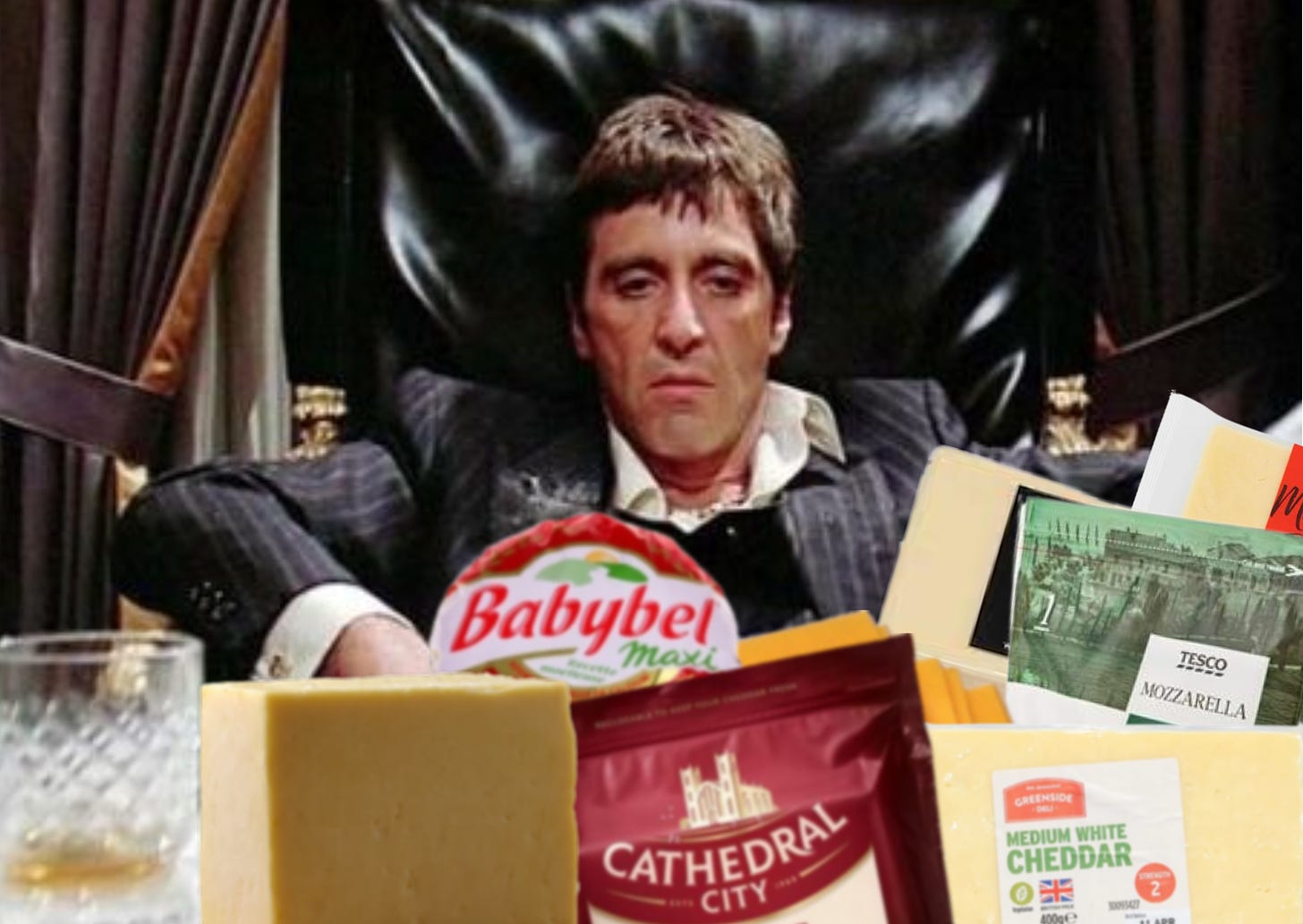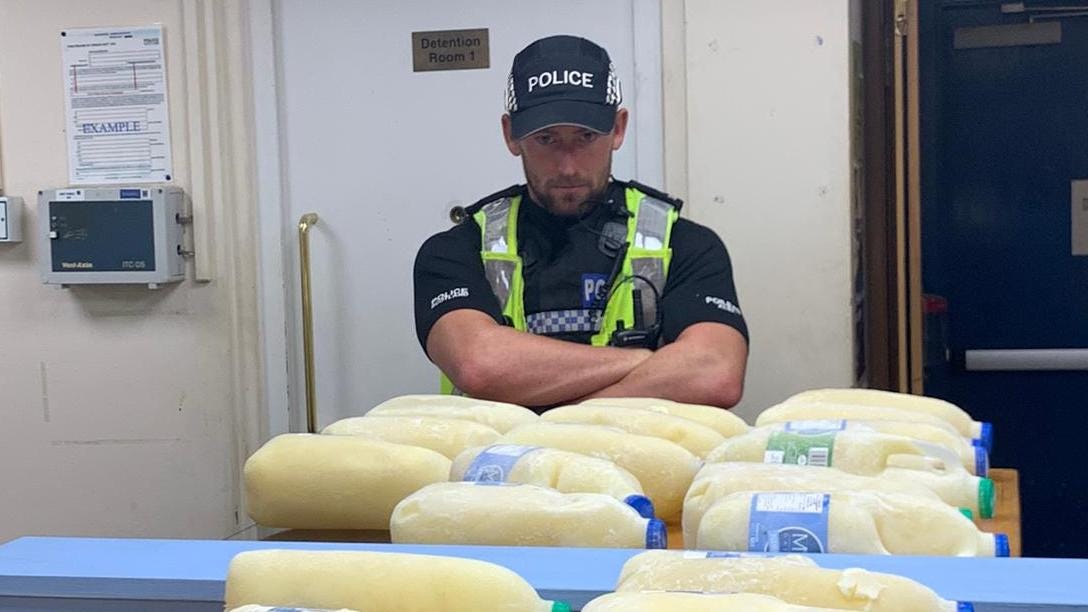Hard cheese
A single Times news story about shoplifting illustrates how 'straight' reporting can betray ideology, even if the writer thinks otherwise.
Previously: Kissed off
On the mediocre spectacle of Keir Starmer's Times interview and my theory of The Time of Noticing/Distraction.
The photo chosen to illustrate a Times story (Shops crack down on theft of butter, 24 November 2022) shows an officer from Glasgow North Police glowering as he stands over a haul of… 30 frozen four-pint bottles of milk. The caption does not read: “We estimate the street value of this semi-skimmed at around £25.” Instead, it says: “Glasgow North police said this week that two people had been arrested and charged for ‘numerous thefts of milk’.”
When the police decided to milk it and tweet proudly about their udderly significant bust on November 22 (“Two persons have been charged and will be reported to the procurator fiscal for numerous thefts of milk and other crimes of dishonesty in the Milton area.”), it resulted in a wave of hilarious responses. But the reporting in The Times is far from funny.
The story, published in print and online, and written by the paper’s Consumer Affairs Correspondent, Andrew Ellson, rests on a premise set up in its first line:
A growing number of everyday groceries are being security-tagged as shoplifting increases amid the cost of living crisis.
What is a “growing number”? Ellson can’t be specific — though he does later quote an ONS stat saying shoplifting has increased by 18% in the year to the end of June —because he is largely following on from recent stories published by other outlets. A collection of anecdotes become a trend by kludging them together. That’s apparent in the second paragraph:
Reports are emerging from across the country of items such as butter, cheese and meat being tagged or locked in security boxes to discourage people from stealing. One Co-op store in Manchester has locked £3 washing machine tablets in security boxes, and even bottles of milk were tagged in one Tesco this week, although the retailer later said this was a mistake.
Let’s break down the constituent parts of that section:
“Reports are emerging” is a tricksy phrase with a passive tone; it hides the source of these “reports” and precisely when they “emerged”. The story about the Co-op store was reported by MailOnline on November 22 with the pictures illustrating it credited to the news agency Jam Press. The same Mail piece included a reference to security tags on milk in Tesco, which was initially in a story from CornwallLive, a Reach-owned local news site, published on November 21.
While The Times story notes that the tags in Tesco were a mistake — the retailer is quoted by CornwallLive saying, “We do not have a policy to place security tags on fresh milk. A very small amount of milk was incorrectly tagged today.” — a Co-op statement carried by MailOnline isn’t quoted. The supermarket told the Mail that the tags "were “not a UK-wide policy” and that it has “seen no rise in instances of theft”, going on to say:
We remain keen to trial new deterrents and this has involved a small-scale trial of packaging for higher-value products. But store managers are empowered to select products which might be prone to theft.
In fairness, Ellson does include a quote from an anonymous “senior industry figure” which gives a similar view:
Supermarkets are trying to take a measured approach but they are making big losses from theft. The growing use of tags is partly a reflection of prices rising, so more items are falling into the price band where it makes sense to tag them. Often the choice of what products to tag is left to local store managers’ discretion. Tags are only being used in certain areas because they have a cost. There is little point, for example, using them in a village store where people generally don’t steal anything.
Using other newspaper stories as data points feeds into the British press’ tendency to signal boost itself to deafening volume but the real problem comes with the choice to include another quote earlier in the story. After a paragraph that establishes two perspectives on the issue…
The security measures have raised concerns on social media that some people are so desperate for food that they are being forced to steal. However, others, including some people claiming to work in stores, have said that products are often stolen by small-time criminals who then sell the items door to door or in pubs.
… the latter gets a colour quote:
One commentator on Twitter, discussing Co-op’s use of security boxes for £3 boxes of Daz, wrote: “Anybody who thinks shoplifters are desperate people stealing to survive has never been in a rough working-class pub on a Friday night and seen them flogging cheese and packs of bacon.”
The “commentator” is a pseudonymous Twitter account using the display name Douglas Bader-Meinhof who sent that quote in reply to a tweet on October 11th about Daz and Persil being placed in security boxes in a branch of Co-op. The account has 35 followers1 at the time of writing and the tweet has one like.
I asked Andrew Ellson — via Twitter — about the inclusion of the tweet2:
I can see that the tweet has been included as colour but does a comment from an anonymous account with 1 like really meet the standard to be included in a national newspaper story?
He replied:
I presented both sides of the debate that appeared on Twitter related to this subject. I chose that quote for no reason other than it was the most colourful one in that thread. You appear to be trying to find a conspiracy where none exists. Do you think my article is unbalanced?
But, in answer to your question, given that I have been very clear about the origin of this quote and that it is an opinion (rightly or wrongly) held by many people, and I’ve given both sides. I believe that its inclusion was justified.
I told him that I do think it’s unbalanced to quote from one side of the debate while not quoting an opposing view. I also told him that I was presenting a comment rather than a conspiracy theory. He replied:
Your conspiracy is suggesting that I had some motivation or agenda while writing this article when actually I was just highlighting a growing problem and then presenting a balance of opinions about why it is happening.
Very often people make ill-founded judgements about newspapers and misunderstand how they work. In this case, there was no nefarious reason why I chose this particular quote. I was not pushing any agenda — I’m sure anyone stealing food is doing so out of poverty.
I chose this quote simply because it was the most colourful on the thread and made my story the liveliest read. I did not include a quote presenting the other side of this Twitter debate as I only had a very limited word count. But I believe overall my article was balanced.
I’ve no doubt that Ellson believes the news story is balanced but I don’t think it is. The desire to include that “colour” unbalanced it; the quote tilts the story in favour of the view that a significant number of people are not stealing basic foodstuffs out of poverty and necessity. Ellson replied:
I don’t agree. The article highlights that rising food prices are one of the issues. I don’t believe any reasonable person reading it would come away thinking that.
Whether I’m reasonable is very much in the eye of the beholder or the opinion of the trained professional but the most punchy and colourful quote in that story is the one that paints a picture of a guy with a half-hundredweight of lamb chops arrayed on the frayed baize of an ageing pool table in a “rough working-class pub”.
My intention in writing this edition of the newsletter is not to attack Andrew Ellson in particular3; I appreciate his replying to my criticism and engaging with it. But I think the way he engaged with it is instructive about a general tendency in the British press and wider media. He told me:
I really feel your criticism is unjustified and shows more about your politics and agenda than mine… I strongly suspect that had I included a quote only from the other side of the Twitter thread you would not be claiming my story was unbalanced and would not be making a fuss out of it on Twitter.
We’re dealing with an irregular verb here: He has a view, I have an agenda; he is unbiased, I have politics. To criticise his story is “making a fuss”. As I replied: If there was no quote from Twitter, the whole story would likely have been one I read and thought about without feeling it warranted criticism.
I’ve drunk in and worked in pubs where blokes — it was almost always blokes — came in to flog hooky meat or piles of ready meals. And, then at least, those dubiously acquired goods had “fallen off the back of a lorry” or been “misplaced” at the factory door. But my recounting of those stories has the same value as the quoted tweet in The Times story — they’re anecdotes and carry my perspective and politics.
Had Ellson introduced that quote, as John Leman Riley suggested on Twitter, with the words: “An anonymous Twitter account with 35 followers said…” I would have found far less to criticise. But that would never happen because all the “colour” would be drained from the opinion as readers realised it was basically bar talk lifted to the level of national newspaper debate.
Even with declining circulations, national newspapers are megaphones and their shouts are amplified by broadcast media. That’s why the simple choice of a “colour” quote matters so much; place an opinion unchallenged in enough newspaper coverage and soon enough it’s a settled view.
Citing other newspapers, police reports, the views of the general public, posts from Twitter and any number of other sources is not bad reporting per se, but the way stories are constructed, the speed with which they are produced, and the weight they give some views compared to others deserves scrutiny. Too often, for instance, despite the weight of precedent, the claims of the police are treated like the word of god.
Reporters and columnists — particularly in the British media — tend to strongly believe that it is only their opponents/critics who have ideology and bias. This single Times story nominally presents ‘both’ sides — there’s rarely just two — but it gives one side all the colour and the weight. It is by no means an outlier. But then, I’m a conspiracy theorist with an inclination to make a fuss, so I would say that, wouldn’t I?
There are currently 6,104 subscribers to this newsletter (up 7 since last time), 469 of whom are paid subscribers (down 1 since the last edition4). If you’re one of them, thanks!
If you’re not, please consider upgrading to help support this newsletter. If I can reach 10% paid subscribers I can write more, commission guest posts, and offer more extra editions and bonus content.
Want to start your own newsletter? Click here to use my referral code.
And if you fancy chatting about the newsletter and other things, we have a Discord.
Thanks to John Hill and The Burnzoid for reading today’s drafts.
Please note, I’m not suggesting that the value of your opinion correlates to how many Twitter followers you have. See: Piers Morgan.
And please don’t have a go at him on my behalf.
It’s always mildly depressing when I lose someone.




